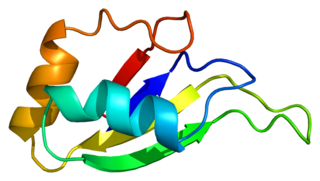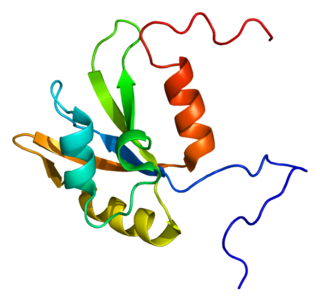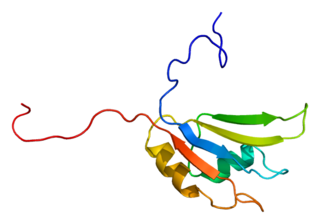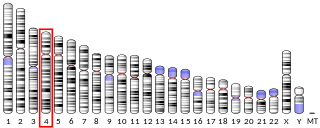
Heterogeneous nuclear ribonucleoproteins (hnRNPs) are complexes of RNA and protein present in the cell nucleus during gene transcription and subsequent post-transcriptional modification of the newly synthesized RNA (pre-mRNA). The presence of the proteins bound to a pre-mRNA molecule serves as a signal that the pre-mRNA is not yet fully processed and therefore not ready for export to the cytoplasm. Since most mature RNA is exported from the nucleus relatively quickly, most RNA-binding protein in the nucleus exist as heterogeneous ribonucleoprotein particles. After splicing has occurred, the proteins remain bound to spliced introns and target them for degradation.

Heterogeneous nuclear ribonucleoprotein A1 is a protein that in humans is encoded by the HNRNPA1 gene. Mutations in hnRNP A1 are causative of amyotrophic lateral sclerosis and the syndrome multisystem proteinopathy.

Heterogeneous nuclear ribonucleoprotein K is a protein that in humans is encoded by the HNRNPK gene. It is found in the cell nucleus that binds to pre-messenger RNA (mRNA) as a component of heterogeneous ribonucleoprotein particles. The simian homolog is known as protein H16. Both proteins bind to single-stranded DNA as well as to RNA and can stimulate the activity of RNA polymerase II, the protein responsible for most gene transcription. The relative affinities of the proteins for DNA and RNA vary with solution conditions and are inversely correlated, so that conditions promoting strong DNA binding result in weak RNA binding.

Heterogeneous nuclear ribonucleoproteins A2/B1 is a protein that in humans is encoded by the HNRNPA2B1 gene.

snRNP70 also known as U1 small nuclear ribonucleoprotein 70 kDa is a protein that in humans is encoded by the SNRNP70 gene. snRNP70 is a small nuclear ribonucleoprotein that associates with U1 spliceosomal RNA, forming the U1snRNP a core component of the spliceosome. The U1-70K protein and other components of the spliceosome complex form detergent-insoluble aggregates in both sporadic and familial human cases of Alzheimer's disease. U1-70K co-localizes with Tau in neurofibrillary tangles in Alzheimer's disease.

Heterogeneous nuclear ribonucleoprotein U is a protein that in humans is encoded by the HNRNPU gene.

Heterogeneous nuclear ribonucleoprotein D0 (HNRNPD) also known as AU-rich element RNA-binding protein 1 (AUF1) is a protein that in humans is encoded by the HNRNPD gene. Alternative splicing of this gene results in four transcript variants.

Heterogeneous nuclear ribonucleoproteins C1/C2 is a protein that in humans is encoded by the HNRNPC gene.

Synaptotagmin-binding, cytoplasmic RNA-interacting protein (SYNCRIP), also known as heterogeneous nuclear ribonucleoprotein (hnRNP) Q or NS1-associated protein-1 (NSAP-1), is a protein that in humans is encoded by the SYNCRIP gene. As the name implies, SYNCRIP is localized predominantly in the cytoplasm. It is evolutionarily conserved across eukaryotes and participates in several cellular and disease pathways, especially in neuronal and muscular development. In humans, there are three isoforms, all of which are associated in vitro with pre-mRNAs, mRNA splicing intermediates, and mature mRNA-protein complexes, including mRNA turnover.

Heterogeneous nuclear ribonucleoprotein F is a protein that in humans is encoded by the HNRNPF gene.

Heterogeneous nuclear ribonucleoprotein H is a protein that in humans is encoded by the HNRNPH1 gene.

Heterogeneous nuclear ribonucleoprotein U-like protein 1 is a protein that in humans is encoded by the HNRNPUL1 gene.

Heterogeneous nuclear ribonucleoprotein L is a protein that in humans is encoded by the HNRNPL gene.

Heterogeneous nuclear ribonucleoprotein A/B, also known as HNRNPAB, is a protein which in humans is encoded by the HNRNPAB gene. Although this gene is named HNRNPAB in reference to its first cloning as an RNA binding protein with similarity to HNRNP A and HNRNP B, it is not a member of the HNRNP A/B subfamily of HNRNPs, but groups together closely with HNRNPD/AUF1 and HNRNPDL.

U2 small nuclear ribonucleoprotein B is a protein that in humans is encoded by the SNRPB2 gene.

Heterogeneous nuclear ribonucleoprotein R is a protein that in humans is encoded by the HNRNPR gene.

Heterogeneous nuclear ribonucleoprotein H2 is a protein that in humans is encoded by the HNRNPH2 gene.

Heterogeneous nuclear ribonucleoprotein A0 is a protein that in humans is encoded by the HNRNPA0 gene.

Heterogeneous nuclear ribonucleoprotein D-like, also known as HNRPDL, is a protein which in humans is encoded by the HNRPDL gene.

Polypyrimidine tract-binding protein 1 is a protein that in humans is encoded by the PTBP1 gene.






















